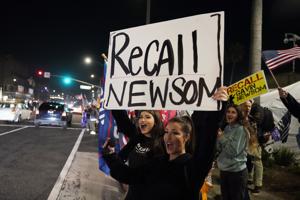Legal experts: Lawsuit challenging constitutionality of California recall election likely to fall flat

(The Center Square) – Exactly one month to the day of the recall election of Gov. Gavin Newsom scheduled for Sept. 14, two California voters filed a lawsuit challenging the constitutionality of the state’s recall system.
Californians Rex Julian Beaber and A.W. Clark sued in U.S. District Court for the Central District of California arguing the state’s recall provision violates the equal protection clause of the U.S. Constitution by allowing a sitting governor to be replaced by candidates who have received fewer votes.
The plaintiffs are asking the court to prohibit the recall election altogether or require that Newsom’s name be added to the second question on the ballot. The ballot consists of two questions: first, do voters want to recall Newsom, yes or no; second, which of the 46 candidates do they want to replace him. If the majority vote yes to recall Newsom, whoever gets the most votes on the second question becomes the next governor.
The plaintiffs argue that the second question allows for the replacement candidate to be elected by a plurality, which they argue is unconstitutional although the process has been in place for decades.
Since 1960, every California governor has faced a formal recall petition. However, only two petitions received enough certified signatures to trigger an election: one against Democratic Gov. Gray Davis in 2003, who was replaced by the Republican actor Arnold Schwarzenegger, and the second against Newsom.
Davis, who received support from 44.6 percent of the voters, was removed from office. His successor, Arnold Schwarzenegger, received 48.5 percent of the vote.
The Sept. 14 ballots have already been sent out for the election and filing deadlines for changes have already passed.
Polls now show a dead heat with Newsom fighting for his political life to keep his job. The leading Republican contender, conservative political commentator Larry Elder, who entered the race in the last few weeks, is leading among his challengers, receiving around 25% of support in polling.
Likewise, the leading Democratic challenger, YouTuber millionaire and former real estate broker Kevin Paffrath, who provides daily commentary on housing, stocks and stimulus checks, leads all 46 candidates running to replace Newsom, with 27% support, according to the most recent poll conducted by Survey USA.
Two Berkeley academics, Erwin Chemerinsky, dean of the University of California, Berkeley School of Law, and law and economics professor Aaron Edlin argue the recall election is unconstitutional. In a recent New York Times op-ed, they write, “The court could declare the recall election procedure unconstitutional and leave it to California to devise a constitutional alternative. Or it could simply add Mr. Newsom’s name on the ballot to the list of those running to replace him. That simple change would treat his supporters equally to others and ensure that if he gets more votes than any other candidate, he will stay in office.”
They argue that the existing process “violates a core constitutional principle that has been followed for over 60 years: Every voter should have an equal ability to influence the outcome of the election.” Pointing to a 1960’s-era Supreme Court ruling regarding the one-person, one-vote principle, they argue that California’s recall process is unconstitutional. “If Mr. Newsom is favored by a plurality of the voters, but someone else is elected, then his voters are denied equal protection. Their votes have less influence in determining the outcome of the election.”
But Vikram David Amar, dean and Iwan Foundation professor of law at the University of Illinois College of Law, and Evan Caminker, former dean, and currently the Branch Rickey Collegiate professor of law at the University of Michigan Law School, argue the opposite.
They maintain that Chemerinsky and Edlin “are wrong on both counts: we see no voting inequality concern of constitutional magnitude here, and the argument they advance was indeed raised (by the incumbent Governor), refuted, and rejected during the Gray Davis recall contest. Indeed, one of us (Amar) made both of these points more than 15 years ago, first in online academic commentary in the months leading up to the Davis recall event, and then again (ironically enough) in the pages of the California Law Review not long thereafter.”
They add that the fatal flaw of the constitutional argument against the recall “is their unarticulated and undefended characterization of the two parts of the recall ballot as constituting a single election in which voters are being asked whom, out of the entire field of wannabe governors including Gavin Newsom, they prefer. Yet the recall vote is no such thing. It is two separate voter decisions – that simply (and for efficiency’s sake) are being conducted by means of a single ballot.”
The court is unlikely to favor the plaintiffs in light of a 2003 California Supreme Court ruling, amar and Caminker argue.
In 2003, Davis sued, arguing that the recall violated the Fourteenth Amendment. He asked the California Supreme Court to rule, among other things, to be allowed to be listed as a candidate on the second question of the ballot. His arguments included the same equal protection arguments as Chemerinsky’s and Edlin’s.
The California Supreme Court denied Davis’ request.
Amar and Caminker maintain that the California Supreme Court and/or the U.S. Supreme Court would reject the plaintiffs’ lawsuit for the same reason.
Disclaimer: This content is distributed by The Center Square
